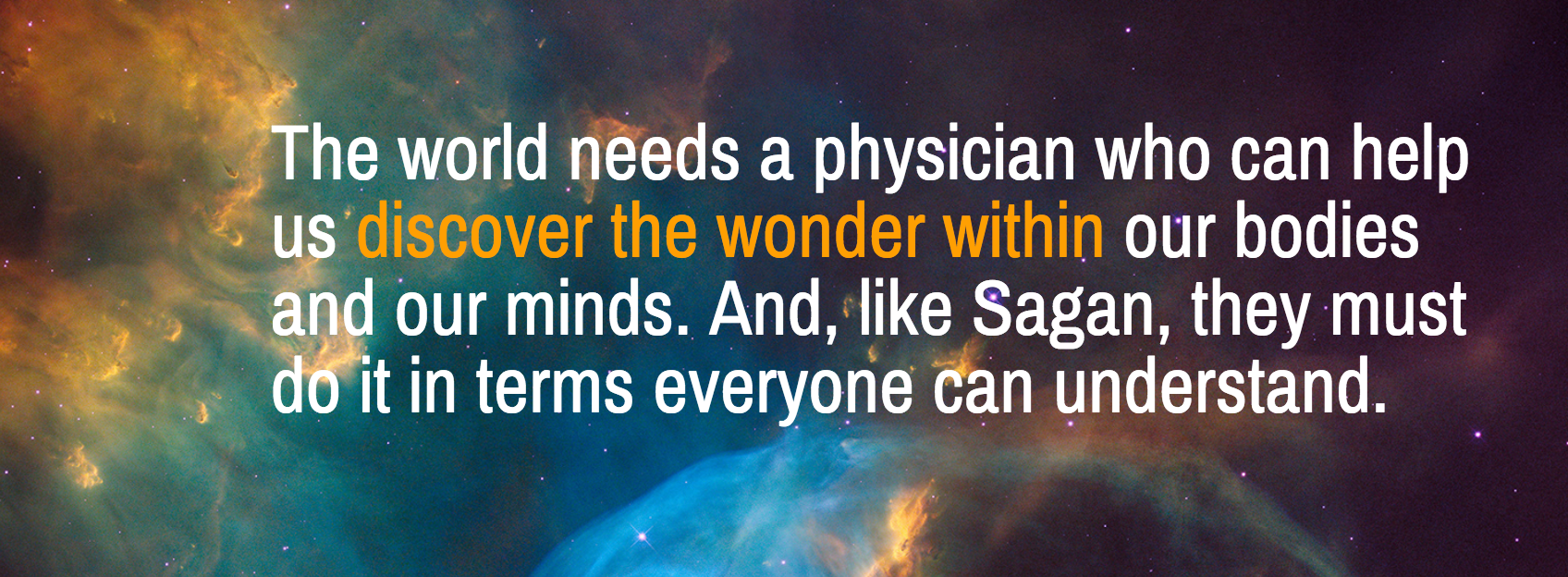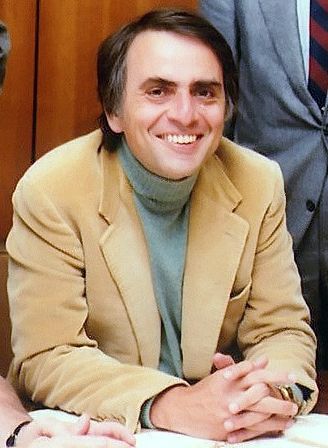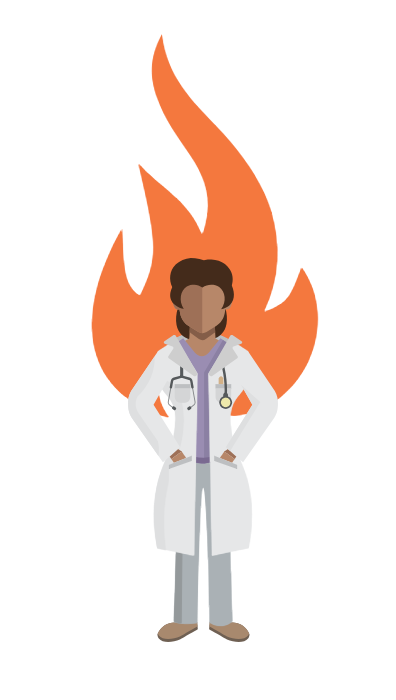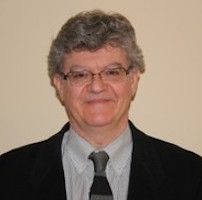Article
Are You The Doctor Who Will Save Us From the Status Quo?
Author(s):
Times are tough. Medicine needs a hero.

Carl Sagan changed my life. In my early twenties I devoured his books, talks and TV shows with an insatiable hunger for the incredible discoveries and elegant metaphors they held. Sagan, one of the world’s most prominent astrophysicists, astronomers, cosmologists—and perhaps its most effective popularizer of science—communicated in simple, soaring language that revealed the complex beauties of the cosmos in a way that almost anyone can grasp.
Want to understand how long the universe has existed? I could tell you it’s been around for 13.8 billion years, and walk away feeling all smart and smug about it. But what good would that do? Neither of us can wrap our heads around what that 13.8 billion years really feels like. On the other hand, I could paint you a picture using a frame of reference we’re all familiar with, like this one from Sagan’s 1977 book The Dragons of Eden:
Think of the history of time as a calendar. If the Big Bang occurred January 1 at 12:00 AM, and the present moment is all the way at the end of the calendar on December 31 just before midnight, here’s the scale: Dinosaurs first evolved on Christmas Day. Primates came into being on December 30. Early humans first used stone tools on New Year’s Eve at 10:24PM, and modern agriculture was born (12,500 years ago!) at 11:59 and 32 seconds.

Sagan’s metaphor is simple, straightforward, and takes almost no scientific knowledge to grasp. But instantly, the incomprehensible age of our universe becomes comprehensible because it was put in terms we all understand.
This is the legacy Sagan left behind. By all accounts, he was a gifted scientist and a superlative thinker (he published more than 600 scientific papers, wrote more than 20 books, and directed a massively popular scientific TV series), but his greatest gift was his ability to communicate the intricacies of science in a way people could understand. In so doing, he ignited in millions of us the same sense of wonder that drove him to devote his life to helping humanity understand its place in the vast time and space of the cosmos.
Sagan’s simple, emotional language lowered the barrier to entry so that millions more people could get involved in science and push the boundaries of human understanding (or at least, take the first step toward learning more about ourselves). Because he made science so accessible, Carl Sagan changed my life. He’s probably changed yours too, if you’re one of the 500 million others who have read his books, listened to his lectures, and watched him on TV.
What's Missing In Medicine?
Now more than ever, medicine needs its own Carl Sagan.Thanks to Sagan, I’ve made my life’s work writing (my first passion) about science (my second). But I write about medicine, a subset of science where Sagan only had ancillary knowledge. His efforts to popularize medicine were limited to critiques of snake-oil peddlers and other proponents of non-evidence-based medicine, but these didn’t appear often in his writing.
This is important, because Sagan’s ideas might have been so infectious that they resulted in lasting effects in the areas of study he popularized, like astronomy, physics, and biology, versus the ones he didn’t, like medicine. Of course, he’d be disappointed if I confused correlation with causation, but it’s worth noting that Sagan’s work might have had real-world implications that persist today.
For example, when many of us think of astronomers, physicists, and biologists, we tend to conjure up images of intrepid thinkers, convention-breakers, and pioneers. On the other hand, the popular image of a physician (however misguided), tends to be more clinical, sometimes cold, and often wrapped up in strange context about big salaries and broken healthcare systems.
There’s no doubt that misconceptions like these abound for physicians, but perception is reality to the masses, and Sagan knew this well. So he rallied for science in an effort to rebrand it. Science isn’t just textbooks, math, and lectures in stuffy classrooms, he argued, it’s humanity’s most noble quest for knowledge. What’s cooler or more important than that?
Wouldn’t it serve humanity well to make the same case for medicine, a noble arm of science whose ultimate goal is our self-preservation? Of course it would! But it’s just not happening yet. Like most parties plagued by misconceptions, setting the record straight is a matter of one’s “own wisdom and courage,” Sagan wrote in Pale Blue Dot. “There is no hint that help will come from elsewhere to save us from ourselves.”
Facing Stacked Odds
Doctors must take that notion to heart, and they mustn’t waste another moment pointing fingers—at politicians who turn a blind eye, at hospitals that overwork them, at cultures that devalue health—at anyone at all. They must rally behind a hero, and take responsibility for their purpose as promoters, maintainers, and restorers of health.By vocation, physicians are responsible for the damage control of a laundry list of very public problems that are rooted in our own ignorance and misconceptions — problems that are literally killing us.
In the US, roughly 160 million people are obese or overweight and more than 100 million Americans now have diabetes or prediabetes, both preventable diseases. Deaths from opioid addiction, which often begins in the clinic, are so frequent that they can be measured by the hour. People are still smoking, for whatever reason, and it’s costing the US more than $300 billion per year in healthcare costs and lost productivity. The list, sadly, goes on.
Spurring many of these issues is the fact that only 12% of US adults have proficient health literacy. According to a report from the Centers for Disease Control and Prevention, “Over a third of U.S. adults—77 million people [in 2003]—would have difficulty with common health tasks, such as following directions on a prescription drug label or adhering to a childhood immunization schedule using a standard chart.”
Right now physicians may be thinking, “Listen: You can lead a horse to water, but you can’t make them drink.” That’s a trope that’s worth considering, but consider this first: Public trust in physicians as leaders is waning, and has declined sharply over the past century, according to a report in the New England Journal of Medicine. In 1966, 73% of Americans said they had great confidence in the leaders of the medical profession. By 2012, that number had dwindled to 34%. Perhaps the horse hasn’t even made it to the watering hole yet.

As a result of this distrust, many patients are looking elsewhere for solutions to their maladies — at their own peril. Naturopaths, homeopaths, herbalists, faith healers, astrologists, and a whole host of pseudoscience-touting quacks claim to be more effective at treating disease, despite a conspicuous lack of evidence. Their practices are not only unethical – they range from ineffective to harmful, and often leave patients with worse health and lighter wallets to boot.
The final boss in this battle against the ever-looming specter of poor health habits is the sellout physicians who promote them, like Deepak Chopra, MD, and Dr Oz. When I say medicine needs a hero, we can look at these impostors as the villains they must defeat. In their insatiable pursuit for fame and cash, Chopra, Oz and similar purveyors of misinformation are actively harming Americans’ health. It’s appalling that we allow them to continue doing so.
Add up these challenges, and there’s no denying that physicians are facing an exhausting uphill battle. The magnitude of these challenges has already resulted in real consequences for physicians, too: They’re experiencing unprecedented levels of physician burnout and even rising rates of physician suicide. Studies have shown that over-stressed physicians provide poorer patient outcomes, which brings many patients back to hospitals, which stresses more providers, and the downward spiral continues.
Fighting the Good Fight
So who will save us from a status quo that’s killing us?We’re fortunate that for every Chopra and Oz out there, there are a thousand upstanding doctors propping up their peers and patients with the best evidence, treatments and advice available.
Look no further than Mark Reid, MD, an academic hospitalist who tweets under the handle @MedicalAxioms. Reid shares “wisdom for the betterment of medical providers everywhere,” and his nearly 50,000 followers are highly engaged, often expressing how much they learn from his tweets.
There’s also @AmyGDalaMD, whose blend of humor, hard-hitting anecdotes and earnest narratives from a life in medicine resonate with many in the #medtwitter community.
Mike Natter, MD, (@Mike_Natter), an internal medicine resident in New York City, leverages Twitter and Instagram to pair his expertise in medicine with his passion for illustration. He brings intricate procedures and pathologies to life so his students can better understand them. To top it off, he sprinkles in a healthy dose of uplifting advice, too.
There are thousands of doctors who are devoted to empowering their peers to bear the calamities of intern year, for instance, or manage the encroach of physician burnout, visualize the complexities in their textbooks, or virtually shadow a veteran physician. These docs produce serious value because their stories help others in the medical community learn, grow and feel good about themselves.
Accounts like @MedicalAxioms, @AmyGDalaMD, and @Mike_Natter suggest that by and large, the medical community has its own back. But what about the billions of people who exist outside of medicine’s ivory tower? Are physicians as interested in helping everyone else learn and grow as they are interested in helping themselves?
Good news. There are plenty of docs out there who direct their value toward patients (beyond traditional treatment, of course). Check out personalities like Jen Gunter (@DrJenGunter), an OB-GYN and self-described “Sexpert” who can be found using her medical expertise to dispel rumors about mainstream pseudoscience, rally against draconian patriarchal laws and institutions that have negative health effects, and destigmatize unconventional sexuality on any given day.
Esther Choo, MD, MPH (@choo_ek) describes herself as an emergency doc, researcher, inappropriate feminist, and “Light-Wielding Shade Thrower.” Like Gunter, Choo leverages her medical expertise to spotlight and condemn abuses of power, defend the defenseless, and help women and minorities realize their inherent worth.
Still others, like Kevin Campbell, MD (@DrKevinCampbell) and Geeta Nayyar, MD (@GNayyar), hold regular spots on cable news channels to educate patients about everything from the looming wonders of health-tech, to the dangers of tanning beds and the benefits of yoga for kids.
There are plenty of good doctors doing great work that benefits all of us, from the ivory tower down to main street. But here’s the problem: Modern medicine tends to behave like an exclusive society, and when it does reluctantly open its doors, it shields its wonders from the rest of humanity in terms that are either too big, too basic, or too boring.
Thinking Bigger
The world needs a doctor who can help us feel the wonder of the cosmos inside of us, so we are self-motivated to take better care of ourselves. It needs a hero who will lower the barrier to entry and bridge gaps in understanding between those who practice medicine, and those who would benefit from a physician’s wisdom.Sagan’s sense of wonder was so developed, he could experience it in something as unassuming as a book.
“What an astonishing thing a book is. It’s a flat object made from a tree with flexible parts on which are imprinted lots of funny dark squiggles. But one glance at it and you’re inside the mind of another person, maybe somebody dead for thousands of years. Across the millennia an author is speaking clearly and silently inside your head directly to you. Writing is perhaps the greatest of human inventions, binding together people who never knew each other, citizens of distant epochs,” he said in Cosmos, the TV series.
The stars, planets, galaxies, the cosmic dust floating in a distant quasar—and even books, as wondrous as they are—are they as wondrous as the human body? That may be a matter of opinion, but mine is a resounding NO! But still, Sagan could explain them in a way that revealed their innate wonder, however grand or slight. How simple must it be, then, to do the same for our bodies and minds? “We are each of us a multitude,” Sagan said. “Within us, is a little universe.” It’s a beautiful thought — one that would help us know and cherish ourselves if we would take it to heart.
The more Sagan came to know the simple wonder of our existence in a vast cosmos, the more he grew to appreciate it, and the greater his desire became to help others appreciate it, too. The world needs a physician who can take that a step further, one who can help us discover the wonder within our bodies and our minds. And, like Sagan, they must do it in terms everyone can understand. A simple, straightforward appreciation of ourselves and the betterment of our collective health will follow quite naturally.
Every day we are getting a clearer picture of the cosmos within us thanks to the hard work of physicians. Many of them, like Sagan, are driven by a limitless sense of wonder. Who among will devote themselves to helping ignite that sense of wonder in others?
Who among them is the hero we need?





